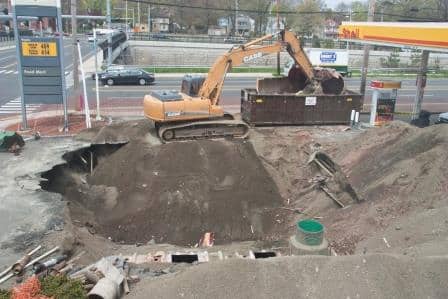Leaking Underground Storage Tanks
Since the majority of these storage tanks contain oil or other petroleum-related substances, the timely correction of a leak is certainly imperative. If a leak persists, then harmful chemicals and other contaminants can pollute the soil and groundwater – jeopardizing drinking water in addition to innumerable eco-systems.
Our Process
When contacted about potential leaking oil storage tanks, Georgia Oilmen’s Services (GOS) performs an initial audit to confirm whether a release is present. Our team will travel to your site and assess the situation using a variety of tools and equipment. If a leak is confirmed, then GOS can begin a corrective action plan. We also work with you and your staff to implement a self-directed program that can help to improve any compliance deficiencies. We utilize Risk-Based Decision Making to eliminate any unnecessary actions.
Pending the confirmation of free contaminants, a remediation program is quickly implemented by the GOS team, provided the tank owner gives his/her permission. By reducing the spread of these free contaminants, GOS can significantly decrease the overall cost of the project.
Reimbursement
Any release must be reported to the appropriate state agency, such as USTMP in Georgia or FDEP in Florida. For new discharges in Florida, also make sure to contact your insurance carrier. Through the GUST trust fund, any tank owner who reports a fuel release to the USTMP will be reimbursed for investigative and remediation services up to $1,000,000 (not including a $10,000 deductible).
Subsequent fuel leaks are not uncommon and can typically occur when investigation or remediation of the first fuel leak is underway. These additional leaks undoubtedly are met with hesitation due to the thought of paying a second $10,000 deductible. However, when confronted by this situation, it’s important to remember that failure to report second releases is not only illegal, but it can also result in significant fines and penalties in addition to creating a delay in receiving the No Further Action Required (NFAR) status from the USTMP.
By seeking the services of an environmental firm, storage tank owners can more quickly detect and mitigate a leaking oil tank. Isolating the leak and protecting external media from the harmful pollution should be handled by trained, insured professionals in order to keep a routine procedure from escalating out of control and costing you extra time and money.
Contact Us
Contact us to learn more about our storage tank services and how we can assist your business.

